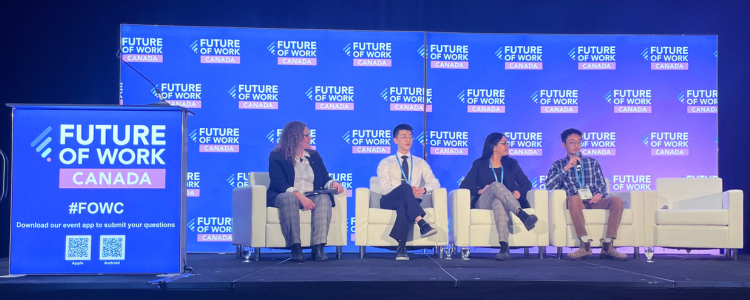Join the conversation...
@HireWaterloo on Twitter

By: Micaela Kelly (she/her)
Gen Z is leading the adoption of artificial intelligence (AI) in their everyday lives. Yet many businesses in Canada continue to shy away from the technology.
According to the KPMG Global Tech Report 2023, Canadian businesses are amongst the slowest to adopt AI in the workplace. Only 35 per cent of Canadian businesses have adopted AI technology into their operations. However, in the United States 72 per cent of businesses use AI technology.
Emerging talent, like co-op students, are early adopters of AI. They want to help businesses benefit from the incredible advantages of using AI in the right way.
At the Future of Work Canada conference on March 6, three Waterloo co-op students discussed how they’ve embraced and worked with AI during their co-op terms and beyond.
Panelists included Waterloo co-op students Komal Vachhani, Brian Li and Yang Li. Jodi Szimanski, associate director of Communications, Engagement and Digital Experience in Waterloo’s Co-operative and Experiential Education department moderated the panel.

Despite its complexity, AI should be a tool to enhance human capabilities rather than a replacement. Understanding the limitations of AI, and the proper application of AI in the workplace, is essential to help ensure responsible use.
“Generative AI is great to help you get started. It can spark initial inspiration and act as a reminder of what’s out there for you to pull from.” – Brian Li
“I use AI to expedite various tasks involved in software changes, tasks that could otherwise take me hours to get done. AI can do it in a few minutes. It helps me complete my work a bit faster which increases my workflow efficiency, and consequently allows me to focus on more software changes.” – Komal Vachhani
As it takes over repetitive tasks, AI's integration into industries like manufacturing will lead to job displacement. However, those willing to adapt, build new skills, and work alongside AI will find that the integration can create new and meaningful opportunities.
“AI decreases menial labour and repetitive tasks, but we still need people to make the stylistic, critical thinking decisions.” – Yang Li
“If you ask AI to write you code, it still needs to be reviewed by a human. You can’t trust AI to write it perfectly.” – Komal Vachhani
AI is already part of everyday life. From helping to curate playlists on your music streaming services, to acting as customer service supports on websites, AI is making tasks easier and more efficient. For more nuanced tasks, strategy and work that requires a human perspective and critical thinking, AI is not the solution.
"When applying for co-op positions, I use GPT to customize my résumé according to each company's specific needs. At the end of the day, it’s my responsibility to make sure the suggestions it provides are still an accurate reflection of my skills."– Komal Vachhani
“If your tasks are rigid or are always the same sequence of steps, AI may not be the right tool. AI excels when you need flexibility and a tool that adapts quickly.” – Yang Li
Almost everyone has heard of ChatGPT. There are many other consumer friendly AI tools for personal or business use. Customizing or creating your own tool isn’t always necessary.
"There are a lot of great tools out there that don’t require everyone to know the nitty-gritty details. Many are designed for consumers to be user-friendly and easier to integrate. Companies could consider using those AI tools instead of customization." – Brian Li
Before jumping in, carefully evaluate the necessity and ethical implications of the tool. Finding the right use case and involving technical expertise are crucial steps in successful integration.
"The way I approach it (is) trying to find the best solution to achieve the goal - what can each of these do for me? What benefit will arise?" – Brian Li
"When you’re dealing with sensitive information, like intellectual property or proprietary information, it’s important to remember that AI exists on the internet. There is a chance of information leaking." – Komal Vachhani
Here’s how:

Work experience:

Work experience:

Work experience:
Join the conversation...
@HireWaterloo on Twitter
The University of Waterloo acknowledges that much of our work takes place on the traditional territory of the Neutral, Anishinaabeg and Haudenosaunee peoples. Our main campus is situated on the Haldimand Tract, the land granted to the Six Nations that includes six miles on each side of the Grand River. Our active work toward reconciliation takes place across our campuses through research, learning, teaching, and community building, and is co-ordinated within the Office of Indigenous Relations.